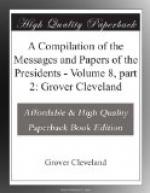GEORGE WASHINGTON.
MAY 18, 1789.
ADDRESS OF THE HOUSE OF REPRESENTATIVES TO GEORGE WASHINGTON, PRESIDENT OF THE UNITED STATES.
SIR: The Representatives of the people of the United States present their congratulations on the event by which your fellow-citizens have attested the preeminence of your merit. You have long held the first place in their esteem. You have often received tokens of their affection. You now possess the only proof that remained of their gratitude for your services, of their reverence for your wisdom, and of their confidence in your virtues. You enjoy the highest, because the truest, honor of being the first Magistrate by the unanimous choice of the freest people on the face of the earth.
We well know the anxieties with which you must have obeyed a summons from the repose reserved for your declining years into public scenes, of which you had taken your leave forever. But the obedience was due to the occasion. It is already applauded by the universal joy which welcomes you to your station. And we can not doubt that it will be rewarded with all the satisfaction with which an ardent love for your fellow-citizens must review successful efforts to promote their happiness.
This anticipation is not justified merely by the past experience of your signal services. It is particularly suggested by the pious impressions under which you commence your Administration and the enlightened maxims by which you mean to conduct it. We feel with you the strongest obligations to adore the Invisible Hand which has led the American people through so many difficulties, to cherish a conscious responsibility for the destiny of republican liberty, and to seek the only sure means of preserving and recommending the precious deposit in a system of legislation founded on the principles of an honest policy and directed by the spirit of a diffusive patriotism.
The question arising out of the fifth article of the Constitution will receive all the attention demanded by its importance, and will, we trust, be decided under the influence of all the considerations to which you allude.
In forming the pecuniary provisions for the executive department we shall not lose sight of a wish resulting from motives which give it a peculiar claim to our regard. Your resolution, in a moment critical to the liberties of your country, to renounce all personal emolument, was among the many presages of your patriotic services which have been amply fulfilled; and your scrupulous adherence now to the law then imposed on yourself can not fail to demonstrate the purity, whilst it increases the luster, of a character which has so many titles to admiration.




